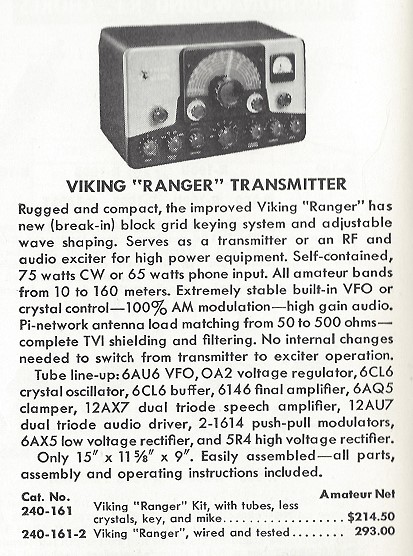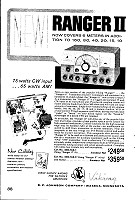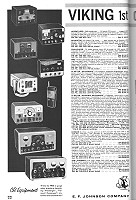
Cropped Advertisement From The 1955 ARRL Handbook

| Johnson Viking Ranger - Main Page and Exterior Photos | Alignment |
| Interior Photos of the Transmitter | Modifications |
| Restoration | Schematic Diagrams and Circuit Descriptions |
| Typical Operating Conditions | Manuals and Advertisements |
Important Safety Note: Working on or testing equipment such as the Viking Ranger is extremely dangerous since very high voltages are present when the equipment is turned on, and may even be present when the equipment is turned off and unplugged. If at all possible, do all work with the equipment off and unplugged and be sure that the capacitors are properly discharged before working on the equipment. The operator assumes all risk and liability in such matters! Do not work on this type of equipment unless you are experienced with working around very high voltages!
Introduction:
There is nothing more important in restoring and operating a piece of equipment
than having a copy of the operating manual and schematic diagram. The operating
manual can give important operating information that will allow the owner to
get the most out of the equipment, and it is next to impossible to repair and
restore a piece of equipment without the schematic diagram.
I hunted through the web and my back issues of QST Magazine and the ARRL
Amateur Radio Handbook to obtain the files below. I am not the one who
originally scanned the documents in .PDF format. I frankly do not remember
where I found them, and therefore express my thanks to those who did scan them
and my apologies that I was not able to give credit to those that so generously
made them available.
Besides the manual and schematic diagram, it is always nice to see
advertisements for a piece of gear that one owns. The ads help place the gear
in its proper perspective and show how it fits into the grand scheme of things.
Below you will find advertisements for the Ranger that appeared in QST magazine
and the ARRL Handbook in the 1950s and the 1960s.
I hope you will find the files below useful in restoring, operating, and
enjoying your Johnson Viking Ranger.
73 and see you on the air,
Greg AA8V
| High Resolution Schematic Diagram: Without a doubt, this is the single most useful file on this page. This high resolution schematic diagram was extracted and processed from the full color catalog pages below. It is the best schematic diagram I have ever found for the standard Johnson Viking Ranger. I doubt you will ever find a better copy of the schematic diagram. You can save a copy by right clicking on the image or link at right and selecting "save link as". (Do not use "save image as", as this will only save the small thumbnail file.) The file is in .JPG format rather than .PDF format because it can then be edited, viewed, and printed using a variety of standard painting/drawing programs such as Windows Paint.. If you want the file in .PDF form, download the full color catalog pages above. |
 Click Here For A High Resolution Schematic Diagram In .JPG Format |
| Operating Manual: This is the second most useful file on this page. (The high resolution schematic diagram above is the most useful file.) It is the 40 page operating manual for the 1954 Ranger. Everything you need to know about operating your Ranger is here including: A. Setup Instructions For Factory Wired Transmitters B. Theory Of Operation - Circuits C. Tuning Procedure D. Pi Network Tuning And Harmonic Suppression E. VFO Calibration Procedure F. Exciter Operation, VFO Zeroing, Push-To-Talk G. Typical Operating Data And Troubleshooting H. Photographs, Charts, And Schematic Diagram I. Parts List The changes in the circuitry between the original Ranger in 1954 and the later versions of the Ranger do not affect the operation of the Ranger, so this operating manual is still usable with all versions of the Ranger. Note: This is a big file. Please save it on your own computer so that you don't need to download it every time you wish to look at it. Right click on the link at right and select "Save link/target as..." You can then run Adobe Acrobat Reader to view the file. |
 Click Here For The Ranger Operating Manual In .PDF Format |
| Assembly Manual: This is the 58 page assembly manual for the standard (1955 - 1961) Ranger. The assembly manual is very useful in that it contains detailed photos and diagrams of the various chassis layouts, including the internal VFO. If you are repairing the Ranger and need to reassemble part of it, the assembly manual can guide you in the process. The assembly manual is particularly useful if you must work on the VFO, as it describes the assembly of the various VFO side panels and the top panel. By following the instructions backwards you can figure out how to properly remove the panels and gain access into the VFO interior. You can then follow the instructions in the normal order to reassemble the VFO cabinet. Note: This is a big file. Please save it on your own computer so that you don't need to download it every time you wish to look at it. Right click on the link at right and select "Save link/target as..." You can then run Adobe Acrobat Reader to view the file. |
 Click Here For The Ranger Assembly Manual In .PDF Format |
| 1st Advertisement In QST Magazine June 1954, Page 77: I have always defined the date that a piece of equipment first hit the market as the date of the first advertisement in QST magazine. For the Ranger the first advertisement was in the June 1954 edition of QST. The ad opened with "Everything you've ever wanted in a compact self-contained transmitter/exciter". It had a "rich lacquer maroon and grey finish.....weighing only 45 pounds". Wow! If that didn't make you want a Ranger, what would? The advertisement refers to Catalog #724 which is available in .PDF format below. |
 Click Here For The 1954 QST Advertisement In .JPG Format |
| Johnson Catalog #724: This file contains the 5 pages of the Johnson Catalog #724 for the 1954 Ranger mentioned in the 1954 QST magazine advertisement above. All of the Rangers are similar enough that the catalog for a different version is still very useful. The catalog includes an advertisement and specifications for the 1954 Ranger, a circuit block diagram, a crystal frequency chart, and a lower resolution schematic diagram. (The 1954 Ranger can be identified by the lack of a bias power supply/timed sequence keying circuit and its associated sub-chassis containing a 6AL5 and 12AU7 tube. ) Note: This is a big file. Please save it on your own computer so that you don't need to download it every time you wish to look at it. Right click on the link at right and select "Save link/target as..." You can then run Adobe Acrobat Reader to view the file. |
 Click Here For Catalog #724 In .PDF Format |
| 1st Advertisement In QST Magazine With Timed Sequence Keying May 1955, Page 85: The standard Ranger with timed sequence keying hit the market with an advertisement in the May, 1955 issue of QST magazine. In a time when few manufacturers worried about the quality of their keying, the Ranger set the standard by introducing "Exclusive!" and "New!" timed sequence keying that had "no clicks" and "no chirp". The kit price increased from $179.50 to $214.50, but the new kit also included all of the tubes. (The 1954 kit did not include the tubes.) |
 Click Here For The 1955 QST Advertisement In .JPG Format |
| Johnson Full Color Catalog Pages: This full color file contains the Johnson Catalog pages for the standard Ranger. It is only two pages, but the second page is the best quality schematic diagram I have yet found. I have extracted that page and processed it to form the high resolution schematic diagram available above. |
 Click Here For The Ranger Catalog Pages In .PDF Format |
| 1st Advertisement For The Ranger II: In September of 1961 Johnson released the Ranger II. "Self-contained in a handsome re-styled cabinet" the Ranger II replaced 11m with 6m but was otherwise internally the same as the the standard Ranger. The kit price rose from $214.50 in 1955 to $249.50 in 1961, not bad considering inflation and the addition of the 6m doubler circuit that was needed for 6m operation. The Ranger II was still a fine transmitter, but interest in SSB had greatly increased and the days of AM were waning, so eventually the Ranger II would be discontinued and become part of history. So it is with many things... |

Click Here For The 1961 QST Advertisement In .JPG Format |
| 1955 ARRL Handbook Advertisement: The improvements in the Ranger came out early enough to be included in the 1995 Johnson advertisement in the 1955 ARRL Handbook. For many years the back of the ARRL handbook was a catalog of amateur radio equipment that provided an excellent snapshot of amateur radio at that time. It also provided the stuff that dreams were made of. All of the equipment was here, including the equipment that many of us could not afford. |

Click Here For The 1955 ARRL Handbook Advertisement In .JPG Format |
| 1962 ARRL Handbook Advertisement: By 1962 the Johnson catalog pages in the ARRL handbook also mentioned newer Johnson products, like the Johnson Valiant and the Johnson Five Hundred. As a sign of the times, CB equipment was also mentioned. Times were changing. |
 Click Here For The 1962 ARRL Handbook Advertisement In .JPG Format |
 Back to Dr. Greg Latta's
Electrical Engineering and Amateur Radio Pages
Back to Dr. Greg Latta's
Electrical Engineering and Amateur Radio Pages
 If you have any questions or
comments, you can send E-Mail to Dr. Greg Latta at
glatta@frostburg.edu
If you have any questions or
comments, you can send E-Mail to Dr. Greg Latta at
glatta@frostburg.edu